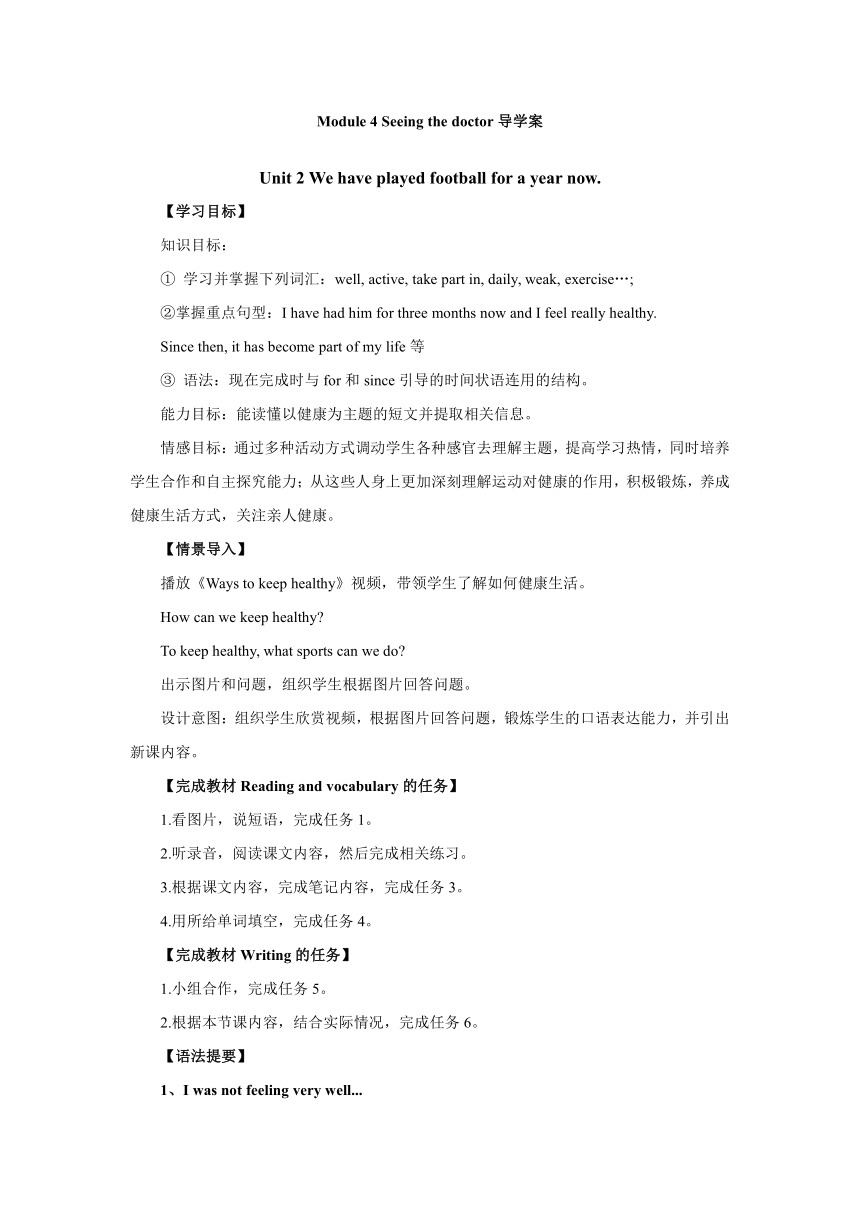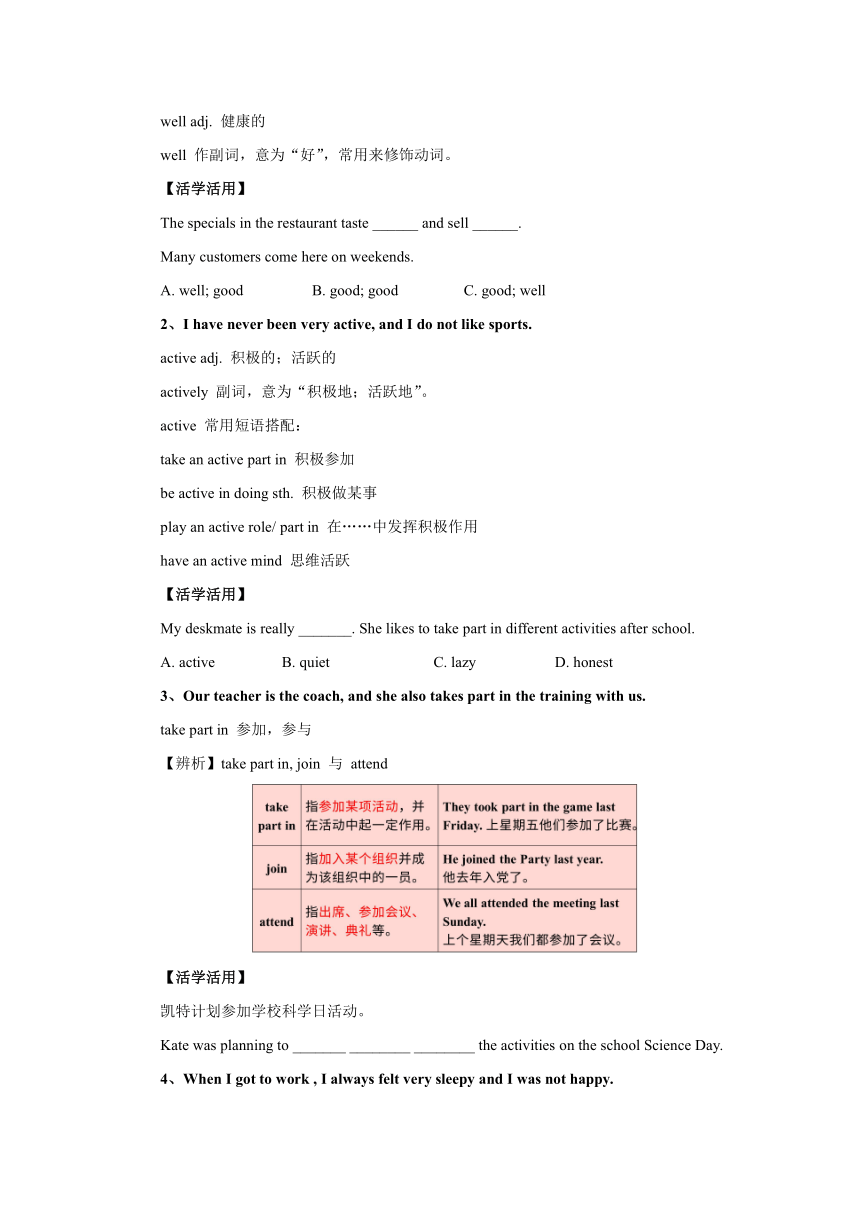外研版八年级下册Module 4 Seeing the doctor Unit1 导学案
文档属性
| 名称 | 外研版八年级下册Module 4 Seeing the doctor Unit1 导学案 |

|
|
| 格式 | docx | ||
| 文件大小 | 136.5KB | ||
| 资源类型 | 教案 | ||
| 版本资源 | 外研版 | ||
| 科目 | 英语 | ||
| 更新时间 | 2024-05-31 16:09:43 | ||
图片预览


文档简介
Module 4 Seeing the doctor导学案
Unit 2 We have played football for a year now.
【学习目标】
知识目标:
① 学习并掌握下列词汇:well, active, take part in, daily, weak, exercise…;
②掌握重点句型:I have had him for three months now and I feel really healthy.
Since then, it has become part of my life等
③ 语法:现在完成时与for和since引导的时间状语连用的结构。
能力目标:能读懂以健康为主题的短文并提取相关信息。
情感目标:通过多种活动方式调动学生各种感官去理解主题,提高学习热情,同时培养学生合作和自主探究能力;从这些人身上更加深刻理解运动对健康的作用,积极锻炼,养成健康生活方式,关注亲人健康。
【情景导入】
播放《Ways to keep healthy》视频,带领学生了解如何健康生活。
How can we keep healthy
To keep healthy, what sports can we do
出示图片和问题,组织学生根据图片回答问题。
设计意图:组织学生欣赏视频,根据图片回答问题,锻炼学生的口语表达能力,并引出新课内容。
【完成教材Reading and vocabulary的任务】
1.看图片,说短语,完成任务1。
2.听录音,阅读课文内容,然后完成相关练习。
3.根据课文内容,完成笔记内容,完成任务3。
4.用所给单词填空,完成任务4。
【完成教材Writing的任务】
1.小组合作,完成任务5。
2.根据本节课内容,结合实际情况,完成任务6。
【语法提要】
1、I was not feeling very well...
well adj. 健康的
well 作副词,意为“好”,常用来修饰动词。
【活学活用】
The specials in the restaurant taste ______ and sell ______.
Many customers come here on weekends.
A. well; good B. good; good C. good; well
2、I have never been very active, and I do not like sports.
active adj. 积极的;活跃的
actively 副词,意为“积极地;活跃地”。
active 常用短语搭配:
take an active part in 积极参加
be active in doing sth. 积极做某事
play an active role/ part in 在……中发挥积极作用
have an active mind 思维活跃
【活学活用】
My deskmate is really _______. She likes to take part in different activities after school.
A. active B. quiet C. lazy D. honest
3、Our teacher is the coach, and she also takes part in the training with us.
take part in 参加,参与
【辨析】take part in, join 与 attend
【活学活用】
凯特计划参加学校科学日活动。
Kate was planning to _______ ________ ________ the activities on the school Science Day.
4、When I got to work , I always felt very sleepy and I was not happy.
sleepy adj. 困的;想睡的
【辨析】sleepy, sleep 与 asleep
【活学活用】
Go to bed if you feel _________(困倦的).
5、It is my daily exercise.
daily adj. 每天的;天天的
daily 用于名词前作定语,相当于 everyday。
以 -ly结尾的形容词:
weekly 每周的 monthly 每月的 yearly 每年的
friendly 友好的 lovely 可爱的 lively 充满活力的
daily adv. 每日,每天 n. 日报
【活学活用】
The e-payment service is now widely used in our _______________(每天的)life.
6、Why don’t we go for a run before school
Why don’t we... 我们为什么不……?
Why don’t you/we... =Why not... 其后跟动词原形,是提建议的一种句型。
“建议”句型:
Let’s... 让我们……
What/How about... ……怎么样?
You’d better do sth. 你最好做某事。
Shall we... 我们……好吗?
Would you like... 你想要……吗?
【活学活用】
The exam is over! Why not ______ to the movies and relax ourselves
A. go B. to go C. going
7、Perhaps I am too weak to do any exercise.
perhaps adv. 可能;也许
perhaps 副词,常用于句首,表示推测,相当于maybe。
【活学活用】
—Do you know where Lucy is
—She _____ has gone shopping with her friend.
A. may be B. can C. perhaps D. possible
8、Perhaps I am too weak to do any exercise.
weak adj. 弱的;虚弱的
反义词
weak adj. → strong
弱的;虚弱的 (强壮的)
↓
weakness n. 虚弱;弱点
Perhaps I am too weak to do any exercise.
too...to... 太……而不能……
【拓展】(1)too... to... 可与so... that... 进行同义句转换,但that 引导的结果状语从句要用否定形式。
(2)too... to... 可与 not... enough to... 进行同义句转换,但not 后面的形容词是 too 后形容词的反义词。
【活学活用】
Kitty, these books are ______ heavy for you ______ carry. Let me help you.
A. as... as B. too... to C. such... that D. so... that
Unit 2 We have played football for a year now.
【学习目标】
知识目标:
① 学习并掌握下列词汇:well, active, take part in, daily, weak, exercise…;
②掌握重点句型:I have had him for three months now and I feel really healthy.
Since then, it has become part of my life等
③ 语法:现在完成时与for和since引导的时间状语连用的结构。
能力目标:能读懂以健康为主题的短文并提取相关信息。
情感目标:通过多种活动方式调动学生各种感官去理解主题,提高学习热情,同时培养学生合作和自主探究能力;从这些人身上更加深刻理解运动对健康的作用,积极锻炼,养成健康生活方式,关注亲人健康。
【情景导入】
播放《Ways to keep healthy》视频,带领学生了解如何健康生活。
How can we keep healthy
To keep healthy, what sports can we do
出示图片和问题,组织学生根据图片回答问题。
设计意图:组织学生欣赏视频,根据图片回答问题,锻炼学生的口语表达能力,并引出新课内容。
【完成教材Reading and vocabulary的任务】
1.看图片,说短语,完成任务1。
2.听录音,阅读课文内容,然后完成相关练习。
3.根据课文内容,完成笔记内容,完成任务3。
4.用所给单词填空,完成任务4。
【完成教材Writing的任务】
1.小组合作,完成任务5。
2.根据本节课内容,结合实际情况,完成任务6。
【语法提要】
1、I was not feeling very well...
well adj. 健康的
well 作副词,意为“好”,常用来修饰动词。
【活学活用】
The specials in the restaurant taste ______ and sell ______.
Many customers come here on weekends.
A. well; good B. good; good C. good; well
2、I have never been very active, and I do not like sports.
active adj. 积极的;活跃的
actively 副词,意为“积极地;活跃地”。
active 常用短语搭配:
take an active part in 积极参加
be active in doing sth. 积极做某事
play an active role/ part in 在……中发挥积极作用
have an active mind 思维活跃
【活学活用】
My deskmate is really _______. She likes to take part in different activities after school.
A. active B. quiet C. lazy D. honest
3、Our teacher is the coach, and she also takes part in the training with us.
take part in 参加,参与
【辨析】take part in, join 与 attend
【活学活用】
凯特计划参加学校科学日活动。
Kate was planning to _______ ________ ________ the activities on the school Science Day.
4、When I got to work , I always felt very sleepy and I was not happy.
sleepy adj. 困的;想睡的
【辨析】sleepy, sleep 与 asleep
【活学活用】
Go to bed if you feel _________(困倦的).
5、It is my daily exercise.
daily adj. 每天的;天天的
daily 用于名词前作定语,相当于 everyday。
以 -ly结尾的形容词:
weekly 每周的 monthly 每月的 yearly 每年的
friendly 友好的 lovely 可爱的 lively 充满活力的
daily adv. 每日,每天 n. 日报
【活学活用】
The e-payment service is now widely used in our _______________(每天的)life.
6、Why don’t we go for a run before school
Why don’t we... 我们为什么不……?
Why don’t you/we... =Why not... 其后跟动词原形,是提建议的一种句型。
“建议”句型:
Let’s... 让我们……
What/How about... ……怎么样?
You’d better do sth. 你最好做某事。
Shall we... 我们……好吗?
Would you like... 你想要……吗?
【活学活用】
The exam is over! Why not ______ to the movies and relax ourselves
A. go B. to go C. going
7、Perhaps I am too weak to do any exercise.
perhaps adv. 可能;也许
perhaps 副词,常用于句首,表示推测,相当于maybe。
【活学活用】
—Do you know where Lucy is
—She _____ has gone shopping with her friend.
A. may be B. can C. perhaps D. possible
8、Perhaps I am too weak to do any exercise.
weak adj. 弱的;虚弱的
反义词
weak adj. → strong
弱的;虚弱的 (强壮的)
↓
weakness n. 虚弱;弱点
Perhaps I am too weak to do any exercise.
too...to... 太……而不能……
【拓展】(1)too... to... 可与so... that... 进行同义句转换,但that 引导的结果状语从句要用否定形式。
(2)too... to... 可与 not... enough to... 进行同义句转换,但not 后面的形容词是 too 后形容词的反义词。
【活学活用】
Kitty, these books are ______ heavy for you ______ carry. Let me help you.
A. as... as B. too... to C. such... that D. so... that
同课章节目录
- Module 1 Feelings and impressions
- Unit 1 It smells delicious.
- Unit 2 I feel nervous when I speak Chinese .
- Unit 3 Language in use
- Module 2 Experiences
- Unit 1 I've also entered lots of speaking competi
- Unit 2 They have seen the Pyramids.
- Unit 3 Language in use
- Module 3 Journey to space
- Unit 1 Has it arrived yet?
- Unit 2 We have not found life on any other planet
- Unit 3 Language in use
- Module 4 Seeing the docto
- Unit 1 I haven't done much exercise since I got m
- Unit 2 We have played football for a year now
- Unit 3 Language in use
- Module 5 Cartoons
- Unit 1 It's time to watch a cartoon.
- Unit 2 Tintin has been popular for over eighty yea
- Unit 3 Language in use
- Revision module A
- Module 6 Hobbies
- Unit 1 Do you collect anything ?
- Unit 2 Hobbies can make you grow as a person.
- Unit 3 Language in use
- Module 7 Summer in Los Angeles
- Unit 1 Please write to me and send me some photos
- Unit 2 Fill out a form and come to learn English
- Unit 3 Language in use
- Module 8 Time off
- Unit 1 I can hardly believe we are in the city ce
- Unit 2 We thought somebody was moving about
- Unit 3 Language in use
- Module 9 Friendship
- Unit 1 Could I ask if you've mentioned this to he
- Unit 2 I believe that the world is what you think
- Unit 3 Language in use
- Module 10 On the radio
- Unit 1 I hope that you can join us one day
- Unit 2 It seemed that they were speaking to me in
- Unit 3 Language in use
- Revision module B
